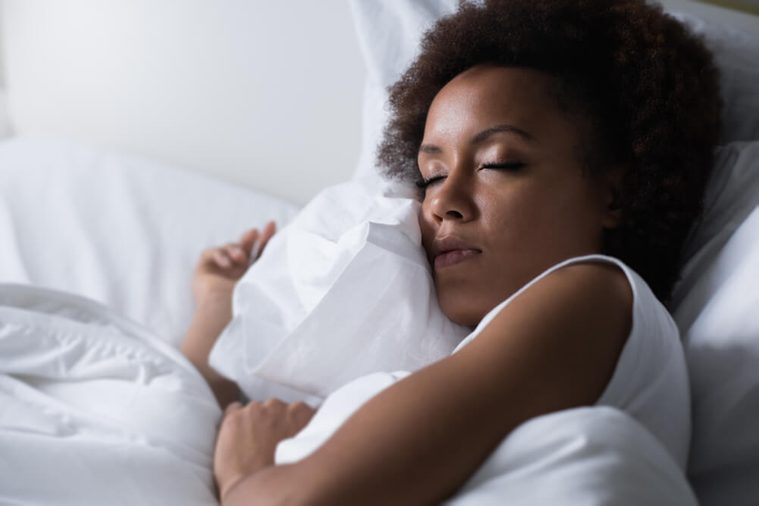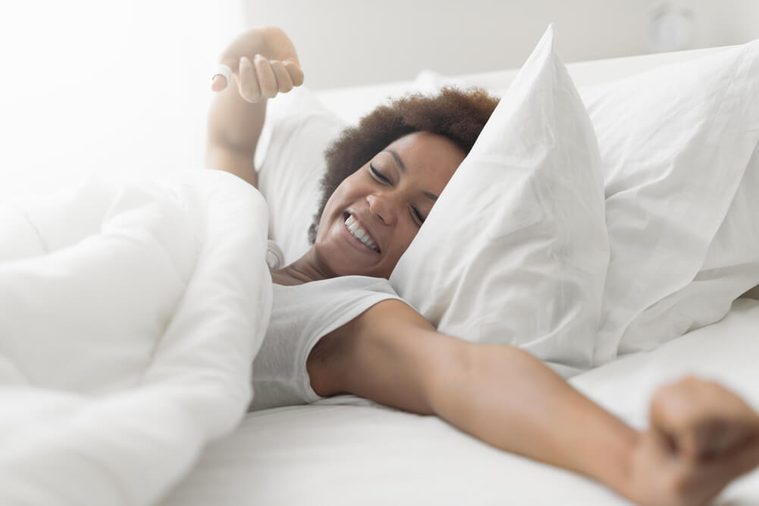9 Awesome Things Your Brain Does When You Sleep
Updated: Jan. 29, 2018
Sleep may leave you unconscious, unaware, drooling, and twitching, but your brain is a hive of activity. Here's what the buzz is all about.
You go through stages

Awake versus asleep isn’t black and white. According to the Division of Sleep Medicine at Harvard Medical School, your body first passes through a stage called non-rapid eye movement, or NREM stage 1. Think of this as the type of sleep when you’re dozing off during class, but still sort of conscious of your surroundings (so you can magically jolt awake when called upon). Next, you move into NREM 2 and NREM 3 before finally settling into rapid eye movement, or REM sleep (this is when you experience those crazy dreams). A full cycle of sleep will take about 90-120 minutes collectively, so the average person will undergo four or five sleep cycles on a typical night. (Check out what happens to your body during these four stages.)
You get a cleaning
When someone says they woke up with a clean slate, they’re not kidding. A 2013 study on mice from the University of Rochester Medical Center found that waste removal systems in the brain are activated during sleep, allowing time to clear away toxic trash that would otherwise pile up and cause problems. While the image of your brain “taking out the trash” seems far-fetched, there’s a scientific explanation for this. According to Sleep Science, cerebral spinal fluid is pumped more quickly throughout the brain while you sleep, flushing out the molecular detritus that can lead to Alzheimer’s and dementia over time.
You create and consolidate memories
During shuteye, the brain is able to shuttle short-term information and recent events into long-term memory. That’s why sleep plays such an important role in learning; it literally helps us solidify new information into the brain for later recall. Matthew Walker, PhD, a University of California, Berkeley sleep researcher, tells the National Institutes of Health, “Sleep after learning is essential to help save and cement that new information into the architecture of the brain, meaning that you’re less likely to forget it.” In other words, if you’ve got an exam coming up, it may be more worthwhile to get some sleep over a few extra hours of cramming.
You’re paralyzed
But it’s for your own safety: Sleep Science reports that during REM, the part of your brain shuts down your motor neurons—they activate your muscles—causing temporary paralysis. Scary—but it prevents you from kicking, thrashing, or otherwise physically acting out your dreams. The paralysis typically lasts about 20 minutes (unless you have sleep paralysis disorder—which is truly frightening.)
Restores energy

Your brain—and your body—need a full night’s sleep to be ready to go the next morning. This explains why you overeat when you don’t sleep enough: Poor sleep can drive up levels of the hunger hormone ghrelin. Even worse, your energy deprivation will drive your brain to seek high-calorie, quick-energy foods like doughnuts, bread, and other simple carbohydrates. This is exactly how much sleep you need if you’re tying to lose weight.
You get better at driving, dancing, and sports
REM sleep is also the time during which your brain solidifies info for physical tasks, embedding the essential moves in your temporal lobe. This is how you’re able to groove a tennis swing, a two-step, or a tricky driving maneuver: Once the information reaches your temporal lobe, you no longer have to consciously perform the action—it will be automatic. “Practice during sleep is essential for later performance,” James B. Maas, PhD, a sleep scientist at Cornell University, tells the American Psychological Association. “If you want to improve your golf game, sleep longer.”
You make big decisions
If you’re torn between two choices, hit the sack: A study published in the journal Current Biology found that the brain processes difficult issues during sleep, helping you formulate a decision after waking up. Forget flipping a coin–what easier way to make big decisions than that?
(Try these little changes to sleep better in just one day.)
You become disengaged
Once your body enters the deeper stages of sleep, your brain detaches from reality, and that helps explain the weird behaviors that can crop up—like walking and talking in your sleep. According to the National Sleep Foundation, abnormal sleep activity increases with sleep deprivation, so make sure you’re getting the requisite seven to eight hours if you start waking up on the kitchen floor. (Find out what sleep disorders could say about your health.)
Your creativity blossoms
Searching for inspiration? A 2007 University of California at Berkeley study found that sleep can make remote associations between pieces of information that our conscious daytime brains would see as separate. In fact, people were 33 percent more likely to make creative connections after a bout of sleep.
Next up, these are the 13 sleep secrets sleep doctors want you to know.
